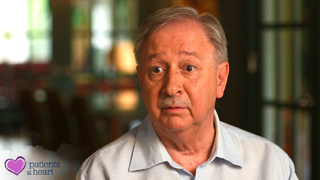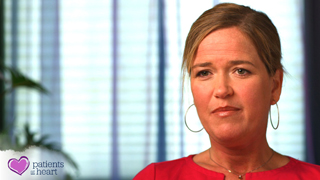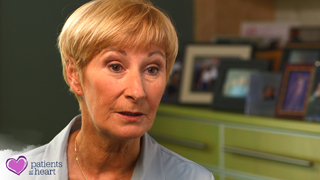Preparing For My Clinical Trial
For anyone participating in a clinical trial, knowledge is both empowering and reassuring. We provide all the information and answers you need before, during and after the clinical trial. That’s because we recognize and appreciate the conviction that goes into your decision, and your vital contribution to the work that researchers couldn’t do without you!
If someone you know is participating in a trial, it’s reassuring to get the facts on their rights and the solid support team dedicated to the well-being of all clinical trial patients. This section can give you insights on how you yourself can be part of a participant’s all-important support network.
PATIENT BILL OF RIGHTS
As the patient, you are at the heart of any clinical study — your rights and protection are a top priority. We want to make sure all patients fully learn and understand their rights before any trial.
You have the right to understand all aspects of the clinical trial, including any possible risks and benefits of participating. The informed consent process makes sure the benefits and risks are clear to you and provided in a printed document for reference.
Become familiar with the consent form
If you decide to participate in a trial, you’ll be asked to read and sign the consent form to confirm that the trial has been explained to you, and that you have agreed to participate.
- If there are any terms or language in the consent form you don’t understand, ask the trial team as many questions as you need for clarification.
- You can take your unsigned consent form home to discuss it with your family, friends or doctor before making your decision.
Learn about potential risks
- The trial team is required to clearly explain all and any potential risks and inconveniences to you, even minor ones.
- When applicable, you will also be told about alternative, recognized medical therapies available.
- In addition, investigators must make you aware of any information that becomes available during the trial that may be relevant to you and the trial patients.
It’s important to us that you feel at ease asking members of the research team as many questions as you need, anytime, to feel fully reassured and informed.
You are absolutely entitled to ask questions about:
- The consent form, or details of the trial itself at any time
- Related procedures or potential expenses
- Any adverse reactions that patients experienced in other trials
- Any other questions about treatments
You will also have access to direct contact with a trial representative and a person from the Ethics Committee. You should always feel that the trial process is transparent and that the research team is approachable and open to giving you any answers and reassurance you need.
Personal health information from your original medical records and all data resulting from your participation is collected in the trial. Your personal health information could include physical examination details, any blood test results, x-rays, other medical procedures, or tissue sample testing. Your identity is always protected through a numbering system: your name and contact details will never be disclosed, unless required by law.
Who sees your data
Information from the trial is submitted to the sponsor, to Health Canada, and potentially to government agencies in other countries (e.g. the US Food and Drug Administration [FDA]). Again, your name or contact information will never appear with the medical data and findings. In fact, medical knowledge is gleaned from accumulated findings across many patients, not individuals. Even trial results published in scientific journals are completely anonymous and cannot be linked to individual trial participants.
Your personal information — kept private and confidential — will be held separately in a secure location at all times. The only people with access to your personal health information in identifiable form will be:
- The trial doctor
- Personnel helping the trial doctor conduct the study at the facility
- Sponsor representatives who check at the study facility that the trial is conducted properly
- The Ethics Committee that reviewed the ethical aspects of the trial
- Local and foreign regulatory authorities where required by law
You have the right to request to see your records from the trial investigator or the facility where the study was conducted. However, you may not be able to review or make a copy of your records until after the study has been completed.
Clinical trial data are highly confidential until the results are published in a medical or scientific journal. Before then, only selected research staff, sponsor, review board and regulatory individuals are allowed to see the trial data. Sharing data with any other person before completion can compromise the validity of the study in its entirety and jeopardize patient confidentiality and privacy. The trial doctor will let you know what information they can and cannot share with you before the trial is officially over.
Participation in a clinical trial is completely voluntary, so you have the right to withdraw from the clinical trial at any time, for any reason.
If you do stop your participation for any reason, you will continue to receive care and advice on your treatment options. You will be asked to return for a final evaluation by the trial doctor, which may include a physical examination and/or laboratory tests.
When you participate in a clinical trial, your health status is closely monitored by the highly qualified, specialized clinical trial doctors who care for you.
The doctor is responsible for providing you with top medical care throughout the study, and ensuring the same level of medical care and follow-up for an appropriate period after the trial, depending on the protocol.
Even if you stop the trial early, the doctor will honour the same trial patient-physician relationship, and continue your care for an adequate period.
However, a clinical trial doctor does not replace the health care professionals you see in your day-to-day life.
Ideally, with your permission, clinical trial doctors and your usual health care team collaborate to avoid repetition of tests and ensure that you get the best possible care during the trial.
Find out more.
A clinical trial simply wouldn’t be possible without the participation of patients. Each patient’s full and diligent participation directly affects the accuracy of the study’s findings, so patients play a key role in a study’s success.
What are a patient's responsibilities?
Tasks vary depending on the trial, but here are some simple steps that can make the process more rewarding for both you and the team following your progress:
- Stay on top of your agenda so you can go to your study visits as scheduled
- Be honest and accurate when filling out any dosing diaries and/or questionnaires and hand them in as per the trial’s schedule
- Keep a note pad handy to track any health problems you are having and share them with study staff, even if they seem trivial
- Check with your trial doctor first before making any changes to the study medication you are taking
- Be sure to ask your trial doctor before taking any additional medications or getting vaccinations: the doctor will let you know which medications are allowed while you are participating
An Ethics Committee (EC) is appointed to review, approve and monitor every single trial conducted in Canada. Throughout the trial and even before a trial begins, your rights as a patient are protected by the EC.
What is an EC?
An Ethics Committee (EC) is sometimes also called an Independent Ethics Committee (IEC), an Institutional Review Board (IRB), an Ethical Review Board (ERB) or a Research Ethics Board (REB).
It is a group of individuals responsible for making sure that the rights, safety and well-being of patients are protected during a clinical trial. The EC can be affiliated with an institution, such as a hospital — making it a local EC — or may be an independent entity. In all cases, the EC is impartial, neutral and objective — never affiliated with the clinical trial it is reviewing.
Who is on an EC?
Every Ethics Committee includes a minimum of five people from varied backgrounds.
- Preferably, EC members should not all be of the same race, gender or cultural background.
- At least one member has a scientific background while another must have a non-scientific background.
- In the case of a local EC, at least one member cannot be affiliated with the institution either directly or via a family member.
What does the EC do?
Before a new clinical trial begins, the Ethics Committee is responsible for reviewing and approving the package of documents received from the sponsor or investigator of the clinical trial, containing:
- The protocol that explains in detail what is being studied and how. The protocol is reviewed to ensure that the research design makes sense scientifically, and that the trial poses no unnecessary risks to patients
- The Investigator Brochure (IB) that includes all current knowledge about the medication being tested. The medication’s safety data in the IB is reviewed
- The consent form, which is given to potential trial participants, explaining all aspects of the study. The consent form is reviewed to make sure the information it contains accurately reflects what is noted in the protocol and IB
- The advertising material is also reviewed to see that it does not unreasonably influence, force or pressure people to participate in the clinical trial
Once all the reviews are complete, the EC votes on whether the clinical trial should be approved. Maintaining patient safety is the EC’s main purpose, so it monitors the trial beginning to end to ensure it is conducted as per the trial documents.
What is a trial sponsor?
The organization or person(s) that funds, undertakes and supervises a clinical trial.
Who can be a sponsor?
- A pharmaceutical, biotechnology or medical device company
- A university
- A health care institution such as an academic medical center, a hospital or a clinic
- A voluntary group, private agency or government health agency
- An individual physician or health care provider
What are the sponsor's responsibilities?
Health Canada requires that sponsors of most clinical trials (i.e. for trials in phase I, II or III) submit information documents regarding the objectives, goals and procedures of the clinical trial as well as information to support the quality of the medication. Health Canada then reviews the application for approval or not. The sponsor also:
- Obtains approval from Health Canada and Ethics Committees to conduct the clinical trial, and complies with regulations before, during and after the trial
- Selects qualified physicians (investigators) and hospitals/clinics to conduct the clinical trial
- Monitors the clinical trial, making sure the study protocol and Good Clinical Practices are respected, and that medical records are complete and accurate
- Continuously monitors and evaluates all safety and efficacy information about the study drug
- Reports any serious, unexpected, adverse drug reactions to Health Canada, the Ethics Committee and investigators
- Keeps all stakeholders up to date on the study drug and the progress of the clinical trial, and answers any questions as they arise
- Analyses the results and makes them available to all stakeholders once the trial is completed
What is a clinical research coordinator?
As many trial doctors will tell you, the study coordinator is their ‘right-hand man’, allowing the doctors to meet all their clinical trial responsibilities by handling the day-to-day logistics and reporting of the trial. Often a certified nurse, the study coordinator is also a great resource for the trial participants.
What are the study coordinator’s responsibilities?
Study coordinators are often involved in the informed consent process and ensuring compliance with the protocol. The coordinator plays a significant role in the trial's success by ensuring that trial visits, tests and procedures are scheduled on time, and that patients understand how to take the study drug and complete the trial questionnaires or diaries.
The study coordinator’s additional responsibilities:
- Preparing various document submissions to the Ethics Committee or the sponsor
- Identifying patients to be approached for the trial
- Caring for patients, coaching them and keeping them informed
- Reporting adverse events and sending data to the sponsor throughout the trial
The hands-on leader of a clinical trial at the research site, the investigator — or trial doctor — is in charge of the conduct of the trial in their hospital/clinic, with a specific focus on patient protection and scientific validity of the trial data.
Who is the principal investigator?
A doctor who is fully qualified to practice medicine and to run clinical trials. All principal investigators are:
- Licensed to practice medicine in the area where they live and work
- Educated, trained and experienced in the proper conduct of a clinical trial
- Familiar with and specialized in the medical field being studied in the trial
- Familiar and compliant with Good Clinical Practices and other review board regulations
Clinical trials sometimes take place in multiple locations, even countries: in these cases, each location has its own principal investigator for the research site.
What are the principal investigator's responsibilities?
While the principal investigator is personally responsible for all aspects of the trial, he/she supervises a team of professionals who all contribute to patient safety and compliance with Good Clinical Practices. In particular, the investigator:
- Makes sure the trial’s objectives, procedures and tests, potential benefits and risks are clearly explained to all clinical trial participants
- Follows the protocol instructions, selects eligible patients, and follows randomization and blinding procedures when applicable
- Provides medical care to trial participants, monitors their safety, and records all adverse effects during the trial
- Notifies the sponsor and the Ethics Committee of any concerns regarding the safety or efficacy of the study drug
THE ALL-IMPORTANT SUPPORT NETWORK
Living with an illness or condition can sometimes be hard work, full of physical and emotional ups and downs. It’s so much easier when you have a solid network of people close to you who empathize, understand your condition, and who truly care about how you feel, on good days and bad.
Your network becomes doubly important when you join a clinical trial, as it has its own set of demands. We’re sharing here some of the valuable insights we’ve learned from trial patients, and the ways you can build and solidify your personal network — the people who can support and sustain you in your daily life and well beyond the clinical trial.
You have the power to build your support team, with the people you know you can rely on during your clinical trial. All kinds of support can come from people like the ones below:
|
Loved ones and other people closest to you |
People in your external support network who care for your health and well-being |
|
When participating in a clinical trial:
|
Once you’ve decided on your network, honesty and communication are key to letting these people actually support you. Clinical trial patients have told us they sometimes ‘held it in’ because they thought they might be perceived as needy or a burden — but people can’t help you with something they don’t know about. Reach out and let them in. Yes, the process can be trying, but it also takes strength and determination, and your family, friends, colleagues and caregivers need to hear that from you.
The people closest to you are crucial to your support network. Often, they want to help, but just aren’t sure how. Help them help you by clearly explaining what you’re doing and why — that the trial’s a commitment you want to honour, and that it involves appointments, journal work, etc. Don’t be afraid to say it might temporarily change life at home, and that you’ll be counting on them for their support.
Things they can do:
They can learn about your clinical trial: Reading this Web site or other sources for general information, and going through the Informed Consent process with you will leave them much better prepared to help. - They can be good listeners: Tell your loved ones that a sympathetic ear is sometimes all you need to feel better. Have frank conversations about the trial process — physically and emotionally. Tell them about your hopes or worries. Above all, keep communicating — silence can lead to assumptions or tension. What’s obvious to you may not be obvious to your loved ones.
- They can be pro-active: Diseases can be unpredictable — so can your clinical trial journey. Ask your family to be adaptable and follow your lead, so you can all handle twists and turns together. As a family, shuffle daily chores, meal planning, etc. so everyone contributes to the game plan before the trial starts, and you are relieved of any guilt or additional stress.
- They can hang in there: Let them know you will need them for the duration. Even when the trial’s schedule slows down and life seems to return to normal, you’ll still need to follow your treatment plan. When the trial’s schedule speeds up, they should be there for you.
The professionals looking after you can offer a whole new perspective — but only if you let them know about your concerns or any problems. You might be surprised at the helpful suggestions they come up with to make your life more comfortable and the trial process more manageable. Never hesitate to discuss the trial with health care professionals — including members of the trial team — and getting the dialogue you need to feel supported, empowered and confident in your decisions.
LIFESTYLE CONSIDERATIONS
Clinical trial patients often wonder how their participation might affect their day-to-day personal and professional life, outside of their actual journey within the trial. This section addresses financial and workplace considerations that are good to know, whether or not they enter into your situation.
Financial aspects
When you’re thinking about joining a clinical trial, any financial considerations will factor into your decision-making process. While the costs are usually not significant, there might be some indirectly related expenses, which we cover in this section to make sure you have all the information you need to plan ahead.
For patients, an experimental treatment given as part of a clinical trial is provided free of charge. The sponsor exclusively assumes the costs of any experimental drugs, treatments and tests used in phases I-III of their clinical trial.
In phase IV observational trials, the drug has already been approved by Health Canada. The doctor prescribes the medication and tests in a “real-life” context. This is the only instance when the cost of medication is the patient’s responsibility. In some instances, there are insurance and payment support programs to assist patients in the reimbursement of the medication.
You may need to account for travel costs to and from the clinic or research site, although some clinical trials will reimburse your transportation and/or parking costs.
You may also want to allocate funds for babysitting or childcare, housecleaning or other household help.
While not an expense, it’s also important to calculate lost income due to time away from work, if any.
The trial coordinator is your best source for helping you calculate any costs and getting the complete picture of what your participation may cost over the course of the full trial period, and whether any of them are reimbursed by the trial sponsor.
Employment considerations
When you join a clinical trial, you, your doctor and the medical team are the only people who know about it. It is entirely up to you to decide if you will share the information and with whom, unless your clinical trial requires time off from your job, in which case, you may need to inform certain colleagues.
Patients sometimes tell their co-workers simply that they’re participating in a research project, without going into details about their condition. Others openly share their decision and the details of their trial experience so that their colleagues better understand the process and learn from it. You’ll find that most of the time, people are very understanding and accommodating, but do seek legal advice if you feel that your job is at risk.
Legally, you are not required to tell your employer anything about your clinical trial. You may decide to use vacation days, in which case you need no justification — but if you do need time off from work and need authorization, you’ll want to inform them about the trial, and pro-actively provide solutions for any times you might not be at work.
If you don't need to request time off, then it's up to you to decide if and when you tell your employer about your participation.
We are providing here a template of the type of letter an employee could send to their employer.
You know your workplace best, and are in the best position to decide who to tell, if at all. You may need to tell co-workers when you are taking time off or reorganizing the workload, but if you do, and you feel the need, you can insist on their discretion.
It isn’t necessary to go into personal details or the mechanics of the trial, unless you’re very close and comfortable with your colleagues at work. Most important is to honestly state the reasons why you’re participating, what it means to you, and potentially to many others in the future.
You can tell them:
- You’ll gain access to a new research treatment that might work for you although it is not yet widely available outside of a clinical trial
- You are helping others by contributing to medical research
- Clinical trials are the path all new medical therapies must take to become accepted practice — a critical and required step to speed cures
- The success of clinical trials depends on the participation of volunteers like you
If they ask for more information, don’t hesitate to send them to Patients at Heart.com. We’re here to help them understand both your condition and trials in general.
- Share your "trial commitments" as soon as you know them: appointments, full or half days off, etc
- Try to come up with accommodations: if you need to go for a trial appointment, offer to take work home, do overtime or work during lunch break — It could serve to show how willing you are to come up with solutions
- Be a good backup for your co-workers whenever you can, and don’t be afraid to ask for their backup when you need it





